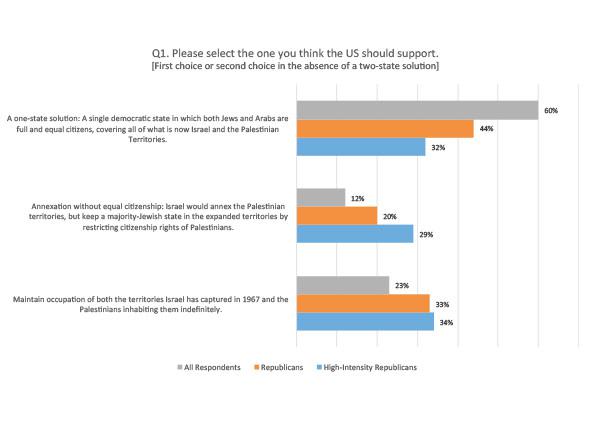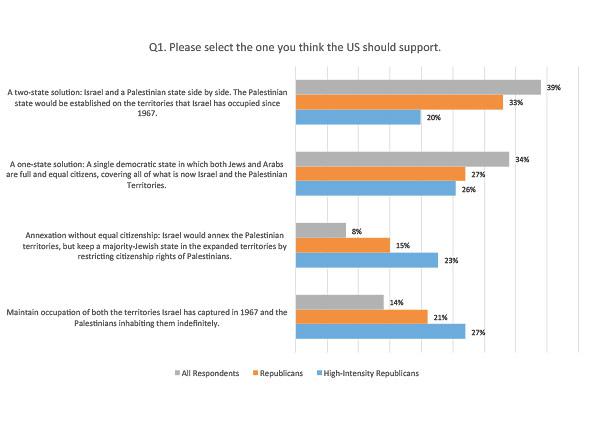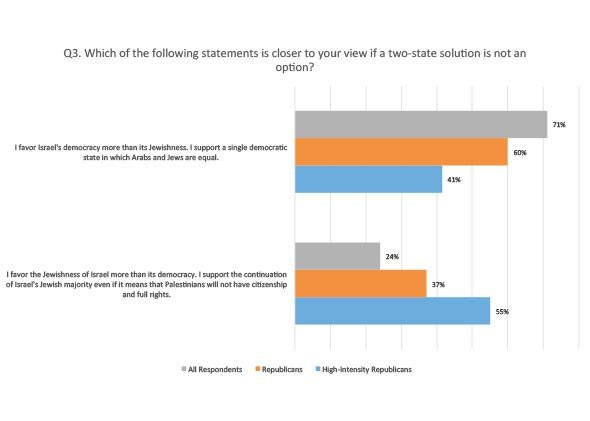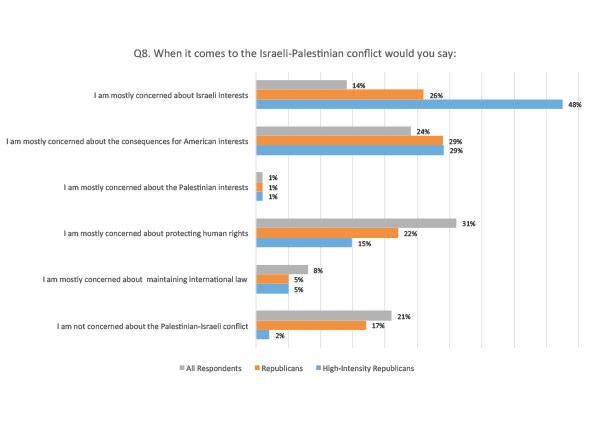Last week, Bloomberg Politics released a survey of American attitudes toward Israel. The poll, according to Bloomberg, found a “deep partisan split.” Two-thirds of Republicans said they were more sympathetic to Israeli Prime Minister Benjamin Netanyahu than to President Obama. When Republicans were asked about U.S.–Israel relations, 30 percent favored this statement: “Israel is an ally but we should pursue America’s interests when we disagree with them.” Sixty-seven percent supported this option instead: “Israel is an important ally, the only democracy in the region, and we should support it even if our interests diverge.”
Some readers of the poll, including me, interpreted it as a sign that many Republicans identify more with Israel than with the United States. Others rejected this interpretation as implicit anti-Semitic McCarthyism. The poll itself has been dismissed as a con job: “deceptive,” “garbage,” and “irresponsible.” Critics say the question about Israeli and American interests was rigged and misleading.
From the critics’ standpoint, it would be convenient if those of us who take the poll seriously were Jew haters, enemies of Israel, or knee-jerk leftists defending an imperial Obama presidency. It would be even more convenient if the poll stood alone. But it doesn’t. Surveys by Gallup, the Pew Research Center, and ABC News and the Washington Post have yielded similar results. And the best recent survey on attitudes toward Israel, released four months ago by the Brookings Institution, backs up Bloomberg’s poll. It shows that Republicans are closely divided between U.S. and Israeli interests, that many of them are driven by religious devotion, and that they prefer Israeli annexation or indefinite occupation of the territories, with restricted rights for Palestinians, to an integrated democracy.
The poll, taken by GfK and designed by Dr. Shibley Telhami of the University of Maryland, asked more than 1,000 Americans how important the Israeli–Palestinian issue was to each of them. Thirty-seven percent of Republicans said it was one of their top five issues. These high-intensity respondents are the people most likely to vote, donate money, or mobilize friends based on this issue. For Republican politicians, they’re a prized constituency. That gives them considerable influence within the party.
I asked Telhami and his research assistant, Katayoun Kishi, to break down the poll’s data not just by party (which they’ve done in a series of slides for Brookings) but also for this high-intensity segment of polled respondents. The results, shown here in a series of graphs, expose profound differences. Start with the question of Israeli settlements in the territories. The poll asked: “Do you think it is all right for Israel to build settlements in these territories, or do you think they should not?” Sixty-three percent of all respondents said Israel shouldn’t build settlements; only 34 percent said it was OK. Republicans were more closely divided: 51 percent opposed settlement construction, but 46 percent said it was OK. Among high-intensity Republicans, the consensus was reversed. Sixty-six percent said settlements were OK; only 31 percent disagreed.

Katayoun Kishi
Defenders of the settlements, led by Netanyahu, argue that Israel’s construction in the territories isn’t really land seizure, since Israel will trade away other tracts in order to keep the settlements when it recognizes a Palestinian state. But Netanyahu undercut that argument last month by declaring that a Palestinian state would not be established during his term. His pledge defied the plurality of Americans who, according to Telhami’s poll, favor a two-state solution. But so what? The pledge secured Netanyahu’s re-election in Israel, and it plays well with his American constituency. As the poll demonstrates, a plurality of high-intensity Republicans favors occupation, not statehood.
The poll offered respondents four options and asked them which one the United States should support. One option was “a two-state solution: Israel and a Palestinian state side by side. The Palestinian state would be established on the territories that Israel has occupied since 1967.” Another option was “a one-state solution: A single democratic state in which both Jews and Arabs are full and equal citizens, covering all of what is now Israel and the Palestinian Territories.” A third option was “annexation without equal citizenship: Israel would annex the Palestinian territories, but keep a majority-Jewish state in the expanded territories by restricting citizenship rights of Palestinians.” A fourth option was to “maintain occupation of both the territories Israel has captured in 1967 and the Palestinians inhabiting them indefinitely.”
Thirty-nine percent of the overall sample favored a two-state solution. Thirty-four percent preferred a one-state solution. Fourteen percent chose indefinite occupation, and 8 percent chose annexation. Republicans were more evenly divided, but the top preference was still a two-state solution, with 33 percent support. Among high-intensity Republicans, the order of preference went the other way. A two-state solution was the least favored option, with 20 percent support. Twenty-six percent chose a one-state solution. Twenty-three percent preferred annexation, and 27 percent preferred indefinite occupation. That’s a 50 percent plurality for occupation or annexation, with explicit restrictions on the rights of Palestinians, rather than for Palestinian autonomy or equal citizenship.

Katayoun Kishi
When the two-state option is removed, the plurality becomes a clear majority. And that scenario is what’s now unfolding. As Israel builds settlements and rules out a Palestinian state in the foreseeable future, the prospect of a two-state solution is fading. For this reason, respondents who initially favored the two-state option were asked which other option they preferred if a two-state solution became impossible. When these people were redistributed to their second choices, the result was a 60 percent majority for a one-state solution. Among high-intensity Republicans, the balance went the other way: 63 percent chose occupation or annexation, while 32 percent chose a one-state solution. Even among Republicans as a whole, a majority—53 percent to 44 percent—preferred occupation or annexation to an integrated democratic state.
Critics of the Bloomberg poll say its question about Israeli interests was biased because it mentioned that Israel is a democracy. They think this word tugged respondents toward the pro-Israel answer. Netanyahu makes the same argument, that Americans support Israel because it’s democratic. But when Telhami’s poll tested the importance of that factor—pointing out that in the absence of a two-state solution, we might have to choose between a Jewish-controlled Israel and a democratic Israel—high-intensity Republicans didn’t choose democracy. They chose Judaism.
The poll asked this question: “Which of the following statements is closer to your view if a two-state solution is not an option?” One option was: “I favor Israel’s democracy more than its Jewishness. I support a single democratic state in which Arabs and Jews are equal.” The other option was: “I favor the Jewishness of Israel more than its democracy. I support the continuation of Israel’s Jewish majority even if it means that Palestinians will not have citizenship and full rights.” Seventy-one percent of respondents chose democracy; 24 percent chose Jewish control. Among Republicans, the gap was narrower, but 60 percent still chose democracy. High-intensity Republicans, however, tilted the other way. They chose Jewish control, 55 percent to 41 percent.

Katayoun Kishi
This religious commitment doesn’t just override regard for democracy and equal rights. For many people, it also overrides American interests. Thirty-one percent of all respondents, 51 percent of Republicans, and 72 percent of high-intensity Republicans said that in mediating the Israeli-Palestinian conflict, the United States should lean toward Israel. The poll asked them why. It offered three possible reasons. One answer was that “Israel and the U.S. have shared values.” Another answer was that “supporting Israel serves the interests of the United States.” The third answer was that “it’s my religious or ethnic duty to support Israel.” Among all respondents who were asked this question, 21 percent said it was their religious or ethnic duty. Among Republicans, the percentage who gave that answer was 27 percent. Among high-intensity Republicans, it was 36 percent. That’s substantially more than the 24 percent who cited shared values, and almost as many as the 38 percent who cited shared national interests.
This is an uncomfortable subject. To many of us, it feels anti-Semitic to raise questions about religious motives, ethnic duty, Jewish control, or divided loyalty. That’s the implicit message in allusions, by some critics of the Bloomberg poll, to “slurs” and “tropes.” But Telhami’s survey indicates that religious devotion to Israel isn’t primarily a Jewish thing. It’s a Christian thing. Among respondents who described themselves as born-again or evangelical Christians, a 38 percent plurality cited religious or ethnic duty, rather than shared national values or interests, as their reason for siding with Israel. Among Jews, religious or ethnic duty was the least cited reason, at 24 percent.
What particularly galls conservatives is the dual-loyalty question. They say the statement affirmed by two-thirds of Republicans in the Bloomberg poll—that “we should support [Israel] even if our interests diverge”—doesn’t necessarily put Israeli interests before American interests. That’s true. But it leaves open the question: How many Republicans truly care more about Israel than about the United States? If the number isn’t 67 percent, what is it?
Telhami’s poll suggests an answer. He posed the question in a different way, by asking respondents to choose from six perspectives on the Israeli–Palestinian conflict. One was: “I am not concerned about the Palestinian–Israeli conflict.” Another was: “I am mostly concerned about protecting human rights.” A third was: “I am mostly concerned about maintaining international law.” The remaining options were “I am mostly concerned about the consequences for American interests,” “I am mostly concerned about the Palestinian interests,” and “I am mostly concerned about Israeli interests.”
Among all respondents, the top answer was human rights, at 31 percent. Twenty-four percent cited American interests, and 14 percent cited Israeli interests. Among Republicans, American interests came in first, at 29 percent. But it was nearly eclipsed by Israeli interests, at 26 percent.
Among high-intensity Republicans, the top answer, by a runaway margin, was Israeli interests. Forty-eight percent said they were “mostly concerned about Israeli interests.” Only 29 percent said they were “mostly concerned about the consequences for American interests.”

Katayoun Kishi
So here’s a summary of what the poll conveys. When Republicans are asked to pick from a range of guiding principles, almost as many choose Israeli interests as U.S. interests. Most Republicans, in the absence of a two-state solution, prefer Israeli control of Palestinians, through occupation or annexation, to a single integrated country with equal rights. Thirty-seven percent of Republicans consider Israel one of their top five issues, and most of these people would abandon democracy in order to make sure Israel remains a Jewish-controlled religious state. By a wide margin, this segment of the GOP cares more about Israeli interests than about American interests, human rights, or any other principle.
That’s not McCarthyism or anti-Semitism. It’s reality. And it raises hard questions about what the Republican Party stands for.
